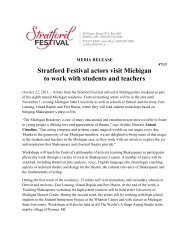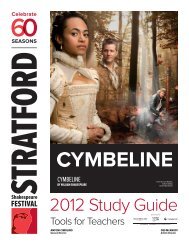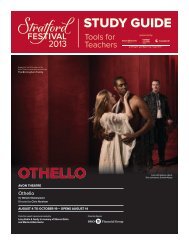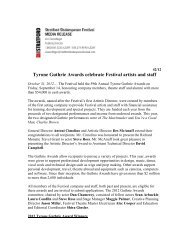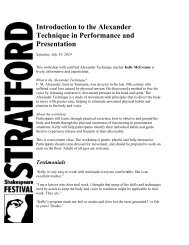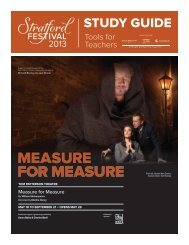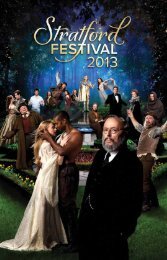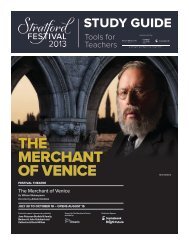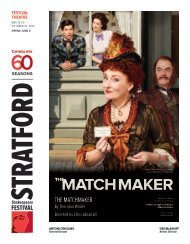Bartholomew Fair Cover.indd - Stratford Festival
Bartholomew Fair Cover.indd - Stratford Festival
Bartholomew Fair Cover.indd - Stratford Festival
Create successful ePaper yourself
Turn your PDF publications into a flip-book with our unique Google optimized e-Paper software.
surprising capacity to pull together and help each<br />
other when trouble strikes. They may be a temporary<br />
community, but they are a community. And their<br />
appeal to the physical side of life makes us confront<br />
a basic truth about ourselves. Quarlous at the end of<br />
the play tells Adam Overdo: “Remember you are but<br />
Adam, flesh and blood! . . . Forget your other name<br />
of Overdo, and invite us all to supper.” Overdo agrees,<br />
and the final promise of a communal feast in which<br />
everyone will join reminds us that what we have in<br />
common is the body, with its appetites, its exposure<br />
to pain and sickness, and its tendency to embarrass<br />
us at inconvenient moments. The <strong>Fair</strong> deals in flesh<br />
and blood, particularly flesh, and to that reality<br />
no one, not even the most respectable theatre<br />
audience, is immune.<br />
Alexander Leggatt is professor emeritus of English at the<br />
University of Toronto.<br />
The Story<br />
On the morning of the annual <strong>Bartholomew</strong>’s Day<br />
fair, proctor John Littlewit is visited by Ned Winwife<br />
and his companion Tom Quarlous. Winwife is wooing<br />
Littlewit’s widowed mother-in-law, Dame Purecraft;<br />
he has a rival, however, in the form of a Puritan<br />
named Zeal-of-the-Land Busy.<br />
Next arrives Humphrey Wasp, manservant to<br />
<strong>Bartholomew</strong> Cokes. Cokes intends to wed Grace<br />
Wellborn, the ward of his brother-in-law Justice<br />
Adam Overdo, and Wasp has come to pick up the<br />
marriage licence. Cokes himself then appears,<br />
accompanied by Grace and Mistress Overdo, and<br />
announces his desire to visit the fair. The entire<br />
party, including Littlewit, who has written a puppet<br />
show to be performed there, decide to go as well.<br />
Meanwhile, unknown to all the others, Justice<br />
Overdo also goes to the fair – in disguise, so that he<br />
may see for himself what “enormities” are perpetrated<br />
upon its grounds.<br />
Soon, all these fairgoers are swept up in the<br />
crimes and confusions of a world inhabited by the<br />
likes of the ruffian Jordan Knockem, the cutpurse<br />
Ezekiel Edgworth and the pig-woman Ursla. By the<br />
end of the day, none remain untouched by their<br />
experiences.<br />
Ben Jonson – playwright<br />
Benjamin Jonson was<br />
born in June 1572, a<br />
month after the death of<br />
his father, a minister. He<br />
attended Westminster<br />
School but was unable<br />
to afford a university<br />
education. Instead, he<br />
became apprentice<br />
to his stepfather, a<br />
bricklayer. He soon<br />
left this employment,<br />
however, to join the English Expeditionary Force<br />
in Flanders, where he claimed to have killed an<br />
opponent in single combat. In 1594, he married Anne<br />
Lewis, who bore him four children, none of whom<br />
survived childhood.<br />
By 1597, Jonson had become an actor in London<br />
and had begun writing plays for the theatre<br />
manager Philip Henslowe. In 1598, he was arrested<br />
for killing fellow actor Gabriel Spencer in a duel and<br />
narrowly escaped hanging – though he was fined<br />
and branded on his thumb. The same year saw his<br />
first big success as a playwright, Every Man in His<br />
Humour, followed in 1599 by a sequel, Every Man out<br />
of His Humour.<br />
Jonson was imprisoned for his outspokenness in<br />
the 1604 satire Eastward Ho! which he co-wrote with<br />
George Chapman and John Marston. He also wrote<br />
two Roman tragedies, Sejanus (1603), the content<br />
of which brought him before the Privy Council to<br />
answer charges of treason, and Catiline (1611). His<br />
finest works, though, are considered to be the four<br />
great comedies Volpone (1606), Epicoene (1609), The<br />
Alchemist (1610) and <strong>Bartholomew</strong> <strong>Fair</strong> (1614).<br />
Despite his brushes with the law, Jonson became<br />
a favourite at the court of King James I, where, in<br />
partnership with the designer Inigo Jones, he became<br />
the era’s greatest deviser of the spectacular form<br />
known as the masque. In 1616, the year he published a<br />
collected edition of his works, he was granted a royal<br />
pension and became unofficial poet laureate.<br />
After Charles I replaced James on the throne in<br />
1625, Jonson ceased to be a regular provider of<br />
masques. He was appointed to the post of city<br />
chronologer in 1628, but the same year suffered the<br />
first in a series of strokes that left him paralysed. He<br />
died on August 6, 1637, at the age of 65, and is buried<br />
in Westminster Abbey, where a marble plaque bears<br />
the inscription “O Rare Ben Jonson.”<br />
5



